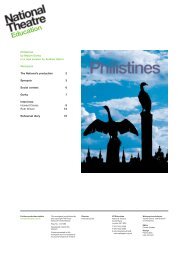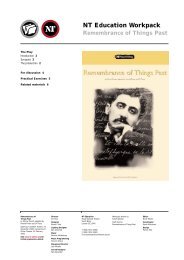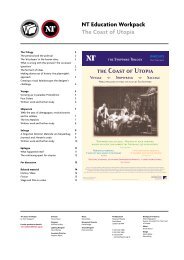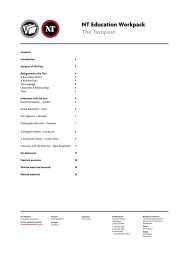Moon on a Rainbow Shawl - National Theatre
Moon on a Rainbow Shawl - National Theatre
Moon on a Rainbow Shawl - National Theatre
You also want an ePaper? Increase the reach of your titles
YUMPU automatically turns print PDFs into web optimized ePapers that Google loves.
The characters<br />
pursue their dreams and ambiti<strong>on</strong>s, or escape from<br />
stifling circumstances. Without that pers<strong>on</strong>a in this<br />
story – and many other stories like it – there would be<br />
n<strong>on</strong>e of the dramatic fricti<strong>on</strong> which is generated as<br />
characters around him react to his choices.<br />
Ephraim is haunted by his past and wishes for a better<br />
future. He is not fully present nor wishes to remain<br />
c<strong>on</strong>nected to his current surroundings. Sometimes<br />
called Eph for short, he works as a trolley bus driver. As<br />
a tenant of Old Mack’s yard, he lives opposite Rosa, his<br />
girlfriend, and also the Adams family. Ephraim’s father<br />
was a transport mule cart driver, for which Ephraim<br />
expresses no respect or positive acknowledgement:<br />
“My ole man was nothin’…Everybody stinkin’ dustbin,<br />
hawk, spit, crap” (Act 3, scene 2).<br />
Ephraim is suffocating from the history of the island<br />
and its c<strong>on</strong>tinuing lack of independence from outside<br />
forces. His pers<strong>on</strong>al family history also troubles and<br />
haunts him, especially with regards to the death of his<br />
Grandmother, a death which Rosa goes so far as to call<br />
a “murder” (Act 2, scene 1). Near the end of this scene,<br />
Ephraim expresses thoughts that are possibly being<br />
shared for the first time in his life with another human:<br />
“My ole man died when I was five years old. When I<br />
was six my mother pick up with another man, went off<br />
to Curacao and left me flat! For nearly a whole week I<br />
went hungry till Grandma came and found me and took<br />
me home with her.”<br />
He goes <strong>on</strong> to put his grandmother into a poor house<br />
so as to progress with his ‘plan’ to leave Trinidad and<br />
speaks of a moment during that period of time that<br />
c<strong>on</strong>tinues to make his heart heavy:<br />
“When they knew she was dying... They send and call<br />
me. She was lying there <strong>on</strong> the bed. I couldn’t believe<br />
it was she. In four days she has sort of wasted away.<br />
I stood there by the door. I couldn’t go no further. She<br />
was looking at me. But I just stood there. Shame eating<br />
me... I heard her ask the nurse for me to come near.<br />
Perhaps to forgive me, I d<strong>on</strong>’t know. But I couldn’t go. I<br />
couldn’t go. Then she told the nurse: Tell that boy if he<br />
can’t come nearer, he might as well go… She died that<br />
night.”<br />
The fact that Ephraim imagines that his grandmother<br />
might possibly have been about to forgive him could<br />
point to his need to be forgiven. He has a deep l<strong>on</strong>ging<br />
to be released from the act of aband<strong>on</strong>ing her in the<br />
poor house and her c<strong>on</strong>sequent death.<br />
Ephraim throws Rosa’s dress at her and pushes her<br />
towards his doorway, but <strong>on</strong>ly at the point that she<br />
calls his grandmother’s death “murder”, does he<br />
literally throw her out of his room as if discarding a<br />
piece of rubbish. There are obviously not the acti<strong>on</strong>s<br />
of the man we see in the company of Esther in Act<br />
1, scene 1. However, the feeling of being trapped <strong>on</strong><br />
the island combined with his memories of a dead and<br />
‘nothing’ father, and of being aband<strong>on</strong>ed by his own<br />
mother followed by days of going hungry, all within<br />
a c<strong>on</strong>text of heroes returning from WWII and a society<br />
hungry for “the Yankee dollar”, it is almost no surprise<br />
that Ephraim was always <strong>on</strong> course to behave this way.<br />
Although Ephraim describes himself as a “big man, not<br />
no damn little boy” in Act 2, scene 1, he is in reality a<br />
hungry and aband<strong>on</strong>ed child whose ancestors were held<br />
captive.<br />
Whether subtle or blatant, Errol John layers the whole<br />
play with symbolism. For example, it is no coincidence<br />
that some of the first words we hear from Ephraim<br />
(referring to Esther’s little baby brother) are that “he<br />
wanted a little air”. The same can also be said for<br />
Ephraim, existing in his stifled and claustrophobic reality.<br />
Ephraim is gradually detaching himself from the yard and<br />
its inhabitants. Although within the c<strong>on</strong>text of banter,<br />
there is an exchange of lines in which Rosa compares<br />
Ephraim with famous leading Hollywood actors. Ephraim<br />
agrees to a likeness to the actor William Holden: “That’s<br />
right, he and me is twins.” Though they are referring to<br />
Holden’s physical appearance, it is ir<strong>on</strong>ic that William<br />
Holden became famous initially for playing a series of<br />
roles that are said to be a combinati<strong>on</strong> of good looks and<br />
cynical detachment.<br />
Before he leaves, Ephraim’s comments <strong>on</strong> his unborn<br />
child sound cruel and heartless – “The baby born, it live,<br />
it dead… It make no damn difference to me”. But the<br />
words do not originate from a thoughtless man with a<br />
cold heart. One of the current cast of the play observed<br />
that “in the traditi<strong>on</strong> of story-telling that is influenced by<br />
the Judeo-Christian teachings, Ephraim is a mythical<br />
‘Christ’ figure. Although he refuses to be nailed to the<br />
cross, he will do almost anything to pursue the future<br />
that he feels is calling him.” This painful moment is all the<br />
more uncomfortable when we’ve seen how loving, caring<br />
and nurturing Ephraim can be.<br />
When we first see Ephraim he is arriving home, but<br />
this home is not <strong>on</strong>e with which he feels any sense of<br />
bel<strong>on</strong>ging: “This Trinidad has nothing for me, nothing I<br />
want”. It is where he is for now and, just like any<strong>on</strong>e who<br />
has no sense of peace, rest or true stillness, he will not<br />
be himself until he feels settled.<br />
The last time he is seen, he departs the yard shouting<br />
“Go, go, go!” He is swapping home for another ‘home’,<br />
in a place that he does not know yet and which gives<br />
no definite idea as to what lays in waiting for him. He is<br />
leaving for an idea. He is leaving for a far-away place that<br />
is spoken about and dreamed of by many, not a place<br />
somewhere over a rainbow but a place of soil, history<br />
and the promise of a great future. It is not without ir<strong>on</strong>y<br />
that he seeks the ‘Mother country’. Who knows, maybe<br />
the little boy <strong>on</strong>ce aband<strong>on</strong>ed will get another chance to<br />
“dream his dreams” in his new home and to “touch that<br />
mo<strong>on</strong>” in a bigger part of the world.<br />
Nati<strong>on</strong>al <strong>Theatre</strong> Learning Background Pack 20















